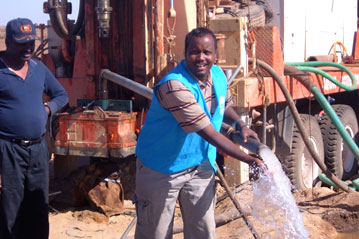UNHCR optimistic about meeting water needs of refugees in Ethiopia
UNHCR has always faced difficulties ensuring that refugees in eastern Ethiopia have enough water, but is optimistic that new projects will solve the problem.
ADDIS ABABA, Ethiopia, April 2 (UNHCR) - Over the past two decades, UNHCR has helped more than 600,000 Somali refugees in the eastern lowlands of Ethiopia. Providing them with enough water has always been a problem, with the UN refugee agency facing funding shortfalls, meagre and difficult to access underground reserves, and competition from locals for the scarce resource.
That's as true today as it was in 1991, when Somalia started disintegrating after the fall of the Siad Barre regime and people began fleeing. Most of the refugees eventually returned home, with just 16,000 remaining in Kebribeyah camp. But renewed conflict in Somalia has led to fresh influxes, prompting UNHCR to open the Aw Barre and Shedder camps in 2007 and 2008 respectively.
Under UNHCR's emergency guidelines, a person needs at least seven litres a day to survive and 20 litres a day to ensure their well-being and good health. Currently, that minimum standard of 20 litres is not being met in any of the three camps, but UNHCR believes that projects now under way should ensure that this target is reached and that access to water outlets is improved.
To meet the needs of Kebribeyah, the former Hartisheik camp and local communities, UNHCR in 2004 opened a pipeline to transport water from the well watered Jarar Valley, some 20 kilometres away.
But, as UNHCR Representative in Ethiopia Moses Okello noted, "Even this huge project does not guarantee an adequate supply of water to every family in the camp. Technical problems, and the high cost of managing the system, mean occasional failure to meet the minimum daily standard of water."
To resolve this problem, the UN refugee agency and the Ethiopian Electric Power Corporation have been working to connect the Jara Valley water supply system to the national electricity grid, which will make it cheaper to power the system than using fuel-guzzling generators. Okello believes this will solve many of the problems related to running the facility.
Meanwhile, to meet daily needs in the Aw Barre and Shedder camps, UNHCR had to truck large quantities of water from a nearby town, drill boreholes and construct a distribution network to ensure that refugees did not have to go far to get access to water.
Okello said that thanks to special funds made available for water and sanitation projects by UN High Commissioner for Refugees António Guterres, "We have been drilling and interconnecting half a dozen boreholes in the two camps. So far we have managed to provide a daily average of 12 litres per person in the two camps."
It is a work in progress. But Okello said he was optimistic that the minimum standard per person of 20 litres a day would be achieved in all three camps once the various water projects had been completed.
Somali refugee Rahma Mohammed Jamale, who fled to Ethiopia to escape conflict in Mogadishu, was one of the first residents of Shedder camp when it opened in May last year. She said it was initially tough finding enough water for herself and her six children.
"We had only two water points for a whole zone and that meant queuing up for hours to get a jerry can of water," she said, adding that the situation was much better but more work was still needed to increase the water supply for the camp's 6,600 refugees and Ethiopians living nearby.
Jamale said the improved water situation meant that children in the camp were spending more time in school and less time lining up for water. "But for this positive development to be sustained, it is up to us refugees to guard the system against misuse," she added.
By Kisut Gebre Egziabher in Addis Ababa, Ethiopia
Related news and stories
Thousands of newly arrived Somali refugees in Ethiopia relocated to new settlement
Samira's Story
Drought brings life-threatening food shortages for refugees in Ethiopia
100,000 new Somali refugees arrive in Ethiopia in the past month, UN and partners are calling for urgent funding
UNHCR teams and partners rush assistance to some 100,000 newly arrived Somali refugees in hard-to-reach area of Ethiopia
As the Horn of Africa drought enters a sixth failed rainy season, UNHCR calls for urgent assistance
-
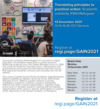
HLOM side event translating principles to practical action
8 Dec 2021 Event-Flyer: Reflecting progress since the Global Refugee Forum in 2019, this event will examine innovative tools, contributions from governments and academics themselves that help ensure that displaced students, scholars and scientists are not left behind. -

UNHCR outraged as three staff members wounded in attack in eastern Democratic Republic of the Congo
8 Dec 2021 -
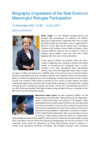
HLOM side event meaningful refugee participation list of speakers
8 Dec 2021 Biography of speakers of the Side Event on Meaningful Refugee Participation (HLOM, 13 December 2021) -

Darfur clashes displace thousands
7 Dec 2021 -
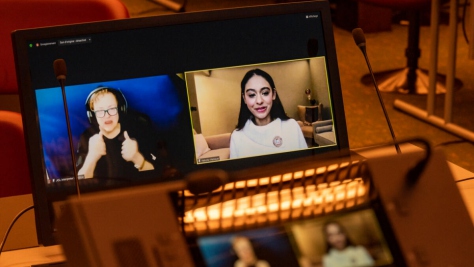
Event days
-

Governments pledge over US$1 billion to support UN Refugee Agency's work for 2022
7 Dec 2021 -

Drumming against gender-based violence in Ecuador
7 Dec 2021 Afro-Ecuadorians and Afro-Colombian refugees use traditional arrullo rhythms and song to open a conversation about gender-based violence. -

Compendium - Protection-sensitive access to clean cooking (2021)
7 Dec 2021 This compendium is intended for UNHCR personnel and partners to support programme development in compliance with UNHCR policies and guidance. It outlines a step-by-step approach and a list of options to address cooking challenges when confronted with limited, inappropriate, inefficient local cooking solutions, or the lack of access thereof. -
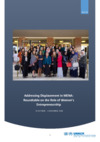
Addressing Displacement in MENA: Roundtable on the Role of Women's Entrepreneurship
7 Dec 2021 The roundtable was a unique opportunity to provide a platform for women entrepreneurs to frame their role in issues related to displacement in the MENA region and identify innovative livelihood strategies and opportunities for refugee women through women's empowerment and economic participation. It was attended by 40 business women from across MENA and refugees from 5 nationalities and urban community centre.

